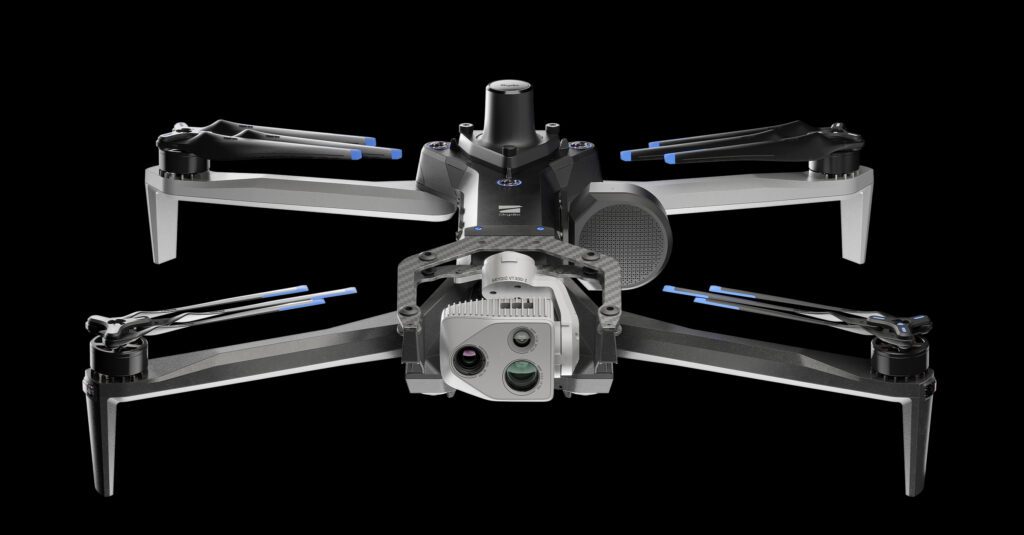Former Red Cat COO Allan Evans Advocates for CHIPS Act-Style Incentives to Accelerate Domestic Drone Manufacturing and Reduce Reliance on Chinese Technology
Editors Note: Today, June 26, 2024 th House Select Committee on the Chinese Communist Party is scheduled to hear testimonies on Chinese subsidies in the drone, semiconductor, steel and shipbuilding industries. Adam Bry, CEO of US drone manufacturer Skydio, is one expert scheduled to testify before the committee.
by DRONELIFE Features Editor Jim Magill
As the U.S. government considers taking steps to limit the importation of Chinese-manufactured drones, it should also consider passing legislation that would incentivize domestic drone producers to innovate their products, the former Chief Operating Officer of American drone company Red Cat Holdings said in an interview.

“I think that as the U.S. government goes toward eliminating being able to import (China’s) DJI from the marketplace, without some additional offset to accelerate or jumpstart domestic manufacturing, you’ll see it take a very long time and require more investment down the road to get us to parity,” said Allan Evans.
Evans, who is currently the CEO of aviation component manufacturing company Unusual Machines, said he thinks that in order to help the domestic drone industry Congress should pass a law similar to the CHIPS Act, which provides incentives to U.S. microchip makers.
In 2022, citing national security fears, U.S. regulators banned the sale and import of new communications equipment from Chinese technology companies, including Huawei and ZTE. That same year, Congress also passed the Creating Helpful Incentives to Produce Semiconductors (CHIPS) and Science Act, which allocated $53 billion in federal incentives for domestic semiconductor research, development and manufacturing.
Currently, Congress is considering several pieces of legislation meant to limit or curtail the importation of drones manufactured in China, such as the Countering CCP Drones Act and the Drones for First Responders Act, both introduced by Rep. Elise Stefanik (R.-New York). The Countering CCP Drones Act place equipment and services produced by DJI Technologies on a Federal Communications list of things deemed to pose an unacceptable risk to U.S. national security.
The Drones for First Responders Act would implement a new tariff on Chinese-produced drones and use the tariff revenue to establish a new grant program to help first responders, critical infrastructure providers and farmers purchase new non-Chinese drones.
Drones: A Critical Technology
“Both sides, the Republicans and Democrats, have identified drones as a critical technology,” Evans said. He said the war in Ukraine, where small, unmanned aerial vehicles have proven to be highly adaptable for use in combat, has alerted lawmakers on both sides of the aisle about the potential dangers of relying too heavily on drones made in countries that don’t align with U.S. interests.
“I think that caused everybody in Congress and the Defense Department to say, ‘Whoa, we need to be able to build these for ourselves,” he said.
In addition to the drones themselves, for a large percentage of small UAVs flown around the world, much of their materials and component parts come from China.
“This is true all the way down to motors that pretty much all come from T-motor, which is a Chinese company. Most of the plastics come out of China and these companies are all building, selling and manufacturing a ton of material, both in Ukraine and Russia right now.”
Of the proposed drone-related federal legislation before the current session of Congress, Evans said he prefers the approach taken by the Drones for First Responders Act, as it combines levying tariffs — that would increase the cost of Chinese-made drones, thus discouraging American consumers from buying them — while using the proceeds from those same tariffs to provide an incentive for the consumers to buy American-made UAVs.
The Importance of US Manufacturing
Evans said that any legislation passed to encourage the growth of the U.S. drone industry should focus on two main areas for incentives, research and manufacturing. Currently, the Department of Defense is focusing a lot of resources toward encouraging drone-related research.
“The other one that we’re not doing is manufacturing. And manufacturing at scale takes a lot of time and to build up the factories,” he said. “In the CHIPS Act, they’re actually giving grants to build factories.”
With grant funding to encourage the growth of the U.S. drone industry, domestic drone manufacturers could reach parity with industry leader DJI within three to five years. Without such funding, even given the passage of the anti-Chinese drone legislation that is currently proposed, it would like take the U.S. drone industry seven to 10 years to catch up with its Chinese competitors, he said.
China Took Steps to Become a Technology Powerhouse
Evans said the U.S. should follow the example of China itself in its efforts to grow a robust domestic drone industry.
“In the late ‘90s, Google and Facebook and some of these other companies were in China, and China kicked them all out. It was called the Great Firewall, and that’s how Tencent and Baidu and Alibaba and their own domestic companies grew in their own marketplace,” he said. These Chinese technology companies are now among the largest in the world.
No American lawmaker has yet proposed a bill similar to the one that Evans is envisioning, and he said that is unlikely to change during the current presidential election year. It is more likely that Congress will pass some form of anti-Chinese drone legislation during the current session and afterwards the lawmakers will realize “Oh no, we didn’t do the other side thing,” Evans said.
“My guess is it will show up in the next cycle,” he said. “Next summer people will start to panic and this will show up and it’ll become a hot topic.”
Read more:
- What is the Countering CCP Drones Act, and What Does it Mean for DJI Drones?
- NDAA Passed the House: What That Means for the Countering CCP Drones Act, and What Comes Next
- New Legislation Balances National Security Concerns with Support for U.S. Drone Industry: “Drones for First Responders Act”
- First Responders Oppose Inclusion of Countering CCP Drones Act in NDAA
Miriam McNabb is the Editor-in-Chief of DRONELIFE and CEO of JobForDrones, a professional drone services marketplace, and a fascinated observer of the emerging drone industry and the regulatory environment for drones. Miriam has penned over 3,000 articles focused on the commercial drone space and is an international speaker and recognized figure in the industry. Miriam has a degree from the University of Chicago and over 20 years of experience in high tech sales and marketing for new technologies.
For drone industry consulting or writing, Email Miriam.
TWITTER:@spaldingbarker
Subscribe to DroneLife here.
